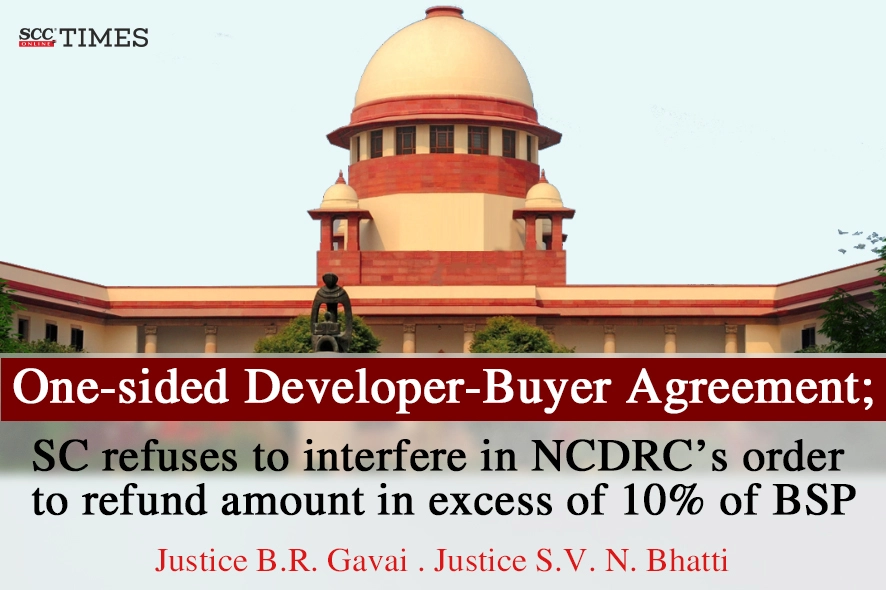Supreme Court: While deliberating over an appeal revolving around cancellation of booking of a flat by the buyer on account of recession in the markets; the Division Bench of B.R. Gavai* and S.V. N. Bhatti, JJ., after perusing the terms of the developer-buyer agreement in the instant case, pointed out that the agreement is one-sided favouring the developer. Relying on relevant precedents, definition of ‘unfair trade practice’ in Consumer Protection Act, 1986 and definition of ‘unfair contract’ in Consumer Protection Act, 2019, the Court reiterated that one-sided Agreements, as in the present case, would be covered by the definition of term “unfair trade practice”.
Taking note of several decisions of NCDRC, wherein it had consistently held since 2015 that 10% of the Basic Sale Price (BSP) is a reasonable amount which is liable to be forfeited as earnest money, the Court declined to interfere with NCDRC’s decision in the instant case direct the Appellants for refund of the amount in excess of 10% of the BSP in the instant case. However, the Court found that the NCDRC was not justified in awarding interest on the amount to be refunded.
Background:
The Complainants had booked an Apartment with the Appellant for BSP of Rs.1,70,81,400 in January 2014. Accordingly, an Agreement was entered into between the Appellant and the Complainants in June 2014. The Complainants were also allotted an Apartment on the 14th Floor in Tower ‘C’ in June 2014. In 2017, the Appellant received the Occupation Certificate and in June 2017 the Appellant offered possession to the Complainants. The Complainants, however, sought cancellation of the allotment and further sought full refund of the amount paid. In September 2017, the Complainants served a legal notice to the Appellant for refund of the amount paid totalling Rs. 51,12,310.
Thereafter, in November 2017, the Complainants approached the NCDRC inter-alia praying that Appellant be directed to refund the sum totalling Rs. 51,12,310 paid by the Complainants so far, with interest @ 18% per annum, calculated from the date of making each payment till the date of realization of the sum. Vide impugned order in 2022, the NCDRC disposed of the Consumer Complaint by directing the Appellant to deduct only 10% of the BSP i.e. Rs. 17,08,140 only towards cancellation of the Complainants’ Apartment and refund the balance amount Rs.34,04,170 (i.e. Rs. 51,12,310 minus Rs. 17,08,140) along with simple interest @ 6% per annum from the date of each payment till the date of refund within three months.
Contentions:
Counsel for the Appellant contented that the Agreement between the parties specifically provided for a forfeiture clause. The Agreement provided that the Appellant was entitled to forfeit the entire earnest money and any other due payable by the buyer including interest on delayed payment. It was argued that NCDRC specifically came to a conclusion that the Appellant was entitled to cancel the Apartment and forfeit the amount as per the terms and conditions of the Application Form and/or the Agreement between the parties. He submits that having arrived at such a finding, the NCDRC could not have come to a conclusion that the condition of forfeiture of 20% of BSP, being the earnest money liable for forfeiture in case of cancellation, was unreasonable and interfered with the same by reducing it to 10% of the BSP.
Per contra, the counsel for the Complainants argued that the NCDRC has consistently held that the condition of forfeiture of 20% of the BSP was not reasonable and reduced it to 10% of the BSP. Citing relevant Supreme Court precedents, the counsel argued that that the condition of forfeiture of 20% of the BSP was one-sided and unconscionable and, therefore, not enforceable in law and as per the Real Estate (Regulation and Development) Act, 2016 and the Haryana Real Estate Regulatory Authority Gurugram (Forfeiture of earnest money by the builder) Regulations, 2018, the forfeiture of earnest money deposit cannot be more than 10% of the BSP.
Court’s Assessment:
Perusing the facts and contentions of the case, the Court noted that the complainants had cancelled the booking due to recession in the market. The Court also noted that as per the Agreement between the Parties, the Complainants were required to pay earnest money deposit of 20% of the BSP, which undisputedly has been paid. Furthermore, in the event of termination on account of Buyer’s Event of Default, the Developer was entitled to forfeit the entire earnest money deposit and other dues including interest on delayed payments as specified in the Agreement.
Considering precedents on forfeiture of earnest money, the Court said that it had been held that to justify the forfeiture of advance money being part of “earnest money” the terms of the contract should be clear and explicit. It has been observed that the earnest money is paid or given at the time when the contract is entered into and, as a pledge for its due performance by the depositor to be forfeited in case of non-performance by the depositor. However, it was also clarified that if the payment is made only towards part-payment of consideration and not intended as earnest money then the forfeiture clause will not apply.
However, the Court explained that it is relevant to consider reciprocal obligations of the Appellant i.e., the Developer in case the Developer does not comply with the timelines in the Agreement. Perusing the Agreement, the Court pointed out that the obligations of the Developer in the event it does not comply with the timelines, a very meagre compensation was provided to the Apartment buyer.
Noting the afore-stated Agreement clauses detailing the obligations of Developer (Appellant) and Buyer (Complainants), the Court found that the Agreement was one-sided, totally tilting in favour of the Appellant-Developer.
The Court relied on Central Inland Water Transport Corporation Limited v. Brojo Nath Ganguly, (1986) 3 SCC 156, wherein it was held that courts will not enforce an unfair and unreasonable contract or an unfair and unreasonable clause in a contract, entered between parties who are not equal in bargaining power.
The Court further pointed out that in the instant case, Section 2(46) of Consumer Protection Act, 2019, which defines “unfair contract”, will be applicable. It was explained that even before enactment of 2019 Act, when Consumer Protection Act, 1986 was in force, the Court using Section 2(1)(r) of the 1986 Act, found that such one-sided Agreements, as in the present case, would be covered by the definition of term “unfair trade practice”.
The Court thus concluded that the instant case would not be covered by the law laid down in Satish Batra v. Sudhir Rawal, (2013) 1 SCC 345 and Desh Raj v. Rohtash Singh, (2023) 3 SCC 714.
The Court further took note of Maula Bux v. Union of India, (1969) 2 SCC 554, wherein it was held that if the forfeiture of earnest money under a contract is reasonable, then it does not fall within Section 74 of the Contract Act, 1872, inasmuch as, such a forfeiture does not amount to imposing a penalty. However, if the forfeiture is of the nature of penalty, then Section 74 would be applicable. It had been further held that under the terms of the contract, if the party in breach undertook to pay a sum of money or to forfeit a sum of money which he had already paid to the party complaining of a breach of contract, the undertaking is of the nature of a penalty. The Court noted that based on the decision in Maula Bux (supra), the NCDRC has consistently decided that 10% of the BSP is the reasonable amount which can be forfeited as earnest money.
Therefore, the Court declined to interfere with the NCDRC’s direction for refund of the amount in excess of 10% of the BSP in the instant case. However, the Court found that the NCDRC was not justified in awarding interest on the amount to be refunded. The Court stated that the Complainant sought cancellation of the booking on account of sharp decline in the prices, and reasoning that a person would be able to buy a flat at a substantially lower price even in Primary market. “It is quite probable that the Respondents would have utilised the money which was payable by them to the Appellant for purchasing another property at a lower rate”.
CASE DETAILS
|
Citation: Appellants : Respondents : |
Advocates who appeared in this case For Petitioner(s): For Respondent(s): |
CORAM :








